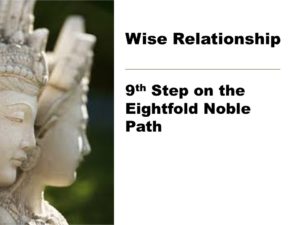Wise Relationship (Part I): Ninth Step on the Eightfold Noble Path

Relational angst is one of the primary sources of pain in this human life. While personal stresses derive principally from our interactions with family members, coworkers, and friends, our psychological dysfunctions also seem increasingly to be permeating the larger socio-cultural whole. Indeed, in my view our collective mental health seems generally to have been in a state of decline in recent years, accelerating in its downward trajectory during the pandemic and with the stressors of our recent national political climate.
Psychological, interpersonal, and social suffering are deeply interwoven. In Buddhist terms, it is all dukkha: part of our universal and essential human dissatisfaction with the terms of human existence. Consistent with what the Buddha taught, it is quite obviously true that greed, hatred, and ignorance are at the root of our relational dukkha. Equally obvious, our individual well-being is interconnected with the well-being of all. For these reasons, I believe that it behooves each of us to inquire deeply about the true meaning of “wise relationship” In doing so, not only can we relieve our own suffering, but in some small way, perhaps, we may also mitigate the suffering of the greater whole.
Although wise relationship is implicit in all limbs of the eightfold noble path (for example, in the applications of right view, intention, action, and speech), Buddhist psychology does not explicitly address the nature of the relational entanglements that give rise to most of our difficulties. If anything, Buddhism tends to point us towards not getting entangled in such things, warning of how readily we can get lost in them. There is merit in taking this caution to heart: personal relationships present formidable challenges. We should all be chastened by the conspicuous examples of otherwise wise teachers who have gotten caught up in very unwise relationships!
**********************
So, a good preliminary inquiry is: What Is a “Wise Relationship”?
Contemplating this question can go in many different directions all at once. It may include ideas about what is virtuous and wholesome, such as those elaborated in Buddhist teachings, but it is also meant to elicit a deeper understanding of what wise relationship is and how we recognize when it is present.
In a very general sense, if we aspire to engage wise relationship, it is helpful to begin from inside: reflecting on your own experience of wise relationship.
Set your mind to recall times that you have felt like you were in the presence of relating wisely with others: either some way that you felt wise, or some way that you have been on the receiving end of someone else’s wisdom.
Recall any parables, teaching stories, or similar that evoke wise relationship for you.
For me, the quintessence of “wise relationship” seems to go to the subjective quality of being with someone; a felt sense. What we can notice is that sometimes it simply feels clear that we are in the presence of wisdom and compassion. When we are interacting with others, there is a deeply felt sense of intimacy and presence.
Sometimes we may feel a sense of channeling wisdom, compassion, or both, which feels very enlivening.
The very same relationship may feel very wise in some moments and very fraught in others. [But then, is that really the same relationship? Can you really step in the same river twice?]
**********************
I find it useful to think of wise relationship as a kind of three-legged race. When there is cooperation, resonance, and synchrony between us, things move along well. When there is not – when instead we encounter a reaction which impedes us — an “entanglement”– we need to examine the disruption and find a wise path forwards towards repair. To invoke Phillip Moffitt’s evocative phrase, we need to practice “dancing with life”, and, as the saying goes, when you stumble, make it part of the dance.
**********************
Entanglements, and the problems that result from them, ultimately stem from our interpersonal reactivity and its emotional roots. Such human difficulties are not optional! Most of us have little or no education about, nor modelling of, how to understand the dynamics between people in relationship nor how to wisely engage the difficulties.
Deep investigation and inquiry can help to illuminate the nature of the entanglements we find ourselves in, and by our willingness to engage with our problems in this way, the path of wise relationship reveals itself. This kind of inquiry is well suited to psychological problems, and some of what we learn is applicable to the understanding of sociocultural conflict as well.
In this and the next series of Inquiring Deeply Newsletters, my intention is to describe a path of contemplative inquiry about Wise Relationship in the form of some questions that can be useful to practice with. I regard such inquiry less as a formal practice than as creative process; a way of practicing with psychological problems. Simply put, in the process of inquiring deeply I pose questions (for myself or to others) as a means of feeling my way into the emotional core of the entanglement.
Asking basic questions of ourselves or others in the face of relational turbulence helps to illuminate what is occurring: what expectations have been disappointed, what psychological needs have been thwarted, or what other difficulty is present.
Fundamentally, deep inquiry is less about the particular questions that we ask than about the way that we listen for the answers. As Albert Einstein wisely said, we cannot solve a problem from the same level of consciousness that created it. We inquire deeply as a way of shifting the way that we relate to our process of relating with others. Questions are a chrysalis in which solutions to our relational problems slowly develop and emerge.
